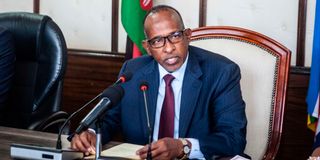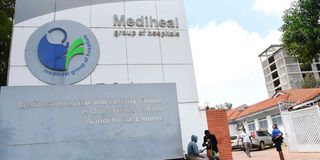CS Duale suspends kidney transplant services at Mediheal Hospital

Health Cabinet Secretary Aden Duale addresses journalists at Afya house, Nairobi, on April 17, 2025.
Health Cabinet Secretary Aden Duale has suspended kidney transplant services at Mediheal Group of Hospitals.
The move comes amid reports of suspicious kidney transplants to Israeli patients at the facility in Eldoret, Uasin Gishu County, by the Kenya Blood Transfusion and Transplant Service (KBTTS) .
CS Duale also announced that two senior officials at the Ministry of Health have been suspended to pave way for further investigation into the scandal.
Dr Maurice Wakwabubi, the acting head of the Kenya Blood Transfusion and Transplant Services (KBTTS), and Dr Everlyne Chege, who chaired a prior internal investigation into the matter in December 2023, have been suspended.
“I am appointing an independent committee of transplant experts, drawn from public and private health facilities, professional associations, and relevant regulatory bodies to undertake a comprehensive audit of all kidney transplant services at the Mediheal Group of Hospitals for the past five years,” he said Thursday.
The committee is expected to report back within 90 days.

The entrance to Mediheal Hospital and Fertility Centre in Eldoret town, Uasin Gishu County on June 20, 2022.
The CS explained that the suspension follows concerns raised in 2023 after a fact-finding mission into the hospital, but whose final report was never formally tabled.
The investigation had raised concerns over suspicious relationships between organ donors and recipients, as well as the possibility of an organ trafficking network.
It also found that many of the transplant surgeries were paid for in cash.

